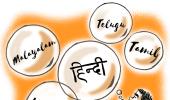With one year left for assembly elections in Karnataka, the last big bastion of the Congress, Chief Minister Siddaramaiah has found an emotive issue to counter the Bharatiya Janata Party as the latter prepares the ground for a fight to grab power. Raghu Krishnan and Nikita Puri report.

On Independence Day last year, #stopHindiimposition was among the top trends on micro blogging platform Twitter.
Arun Javagal, a software engineer who has been pushing for equality for all languages, was among those who used his Twitter handle to post messages on this.
This month, Javagal and his group of about 400 activists ran a campaign against Hindi signboards on the Bengaluru Metro rail -- #NammaMetroHindiBeda (We don’t need Hindi in our Metro), got over 1,500 million impressions, as people tagged and commented on the subject.
To his surprise, the campaign found support from Hindi-speaking regions such as Bihar and Rajasthan.
"People are demanding official status to Bhojpuri and Rajasthani," says Javagal, who for eight years has been asking for amendments to Articles 343 to 351 of the Constitution, which grants official status to Hindi.
These Articles empower the Centre to promote Hindi across the country.
So, whether it is banking exams or the railways, or in post offices, usage of Hindi is encouraged, forcing people who do not know Hindi to being left out of opportunities, is the grouse.
"We are not saying Hindi is not required. What we are demanding is: Please give equal status to all languages, whether Kannada, Tamil or Telugu," says Javagal, who feels the campaign against the imposition of Hindi being hijacked by Karnataka’s politicians is a positive move.
"We are common people and can only push so much. It is the politicians who can debate in Parliament and bring amendments to the Constitution for equal rights to all languages," he says.
Political move by Siddaramaiah
With one year for the assembly elections in Karnataka, the last big bastion of the Congress, Chief Minister Siddaramaiah has found an emotive issue to counter the Bharatiya Janata Party as the latter prepares the ground for a fight to grab power.
Siddaramaiah has made it clear that he would not allow the imposition of Hindi in the (Bengaluru) Metro, and asked for a study on how it is being done in other cities. Kannada activists have blackened Hindi boards at Metro stations.
This has been criticised.
One ground is that are central funds for the mass transport system. The other argument for Hindi is that there is a large population from the north who have migrated to the city for work, at software and other companies, over the past decade.
Last month, Siddaramaiah wrote to the Centre as the state incurred majority of the costs, incurred operational losses and committed to repay loans of the Metro project, it is appropriate that local policies are adopted.
He also cited the widespread protests against imposition of Hindi and to respect sentiment of Kannadigas, the primary users of the mass transport system, he has directed the Metro officials to change sign boards with only English and Kannada.
"The protests are not against the Hindi language but the casual sense of entitlement that informs the move. Notice how then Union minister Venkaiah Naidu justified it on the false grounds that Hindi is our national language," says Prakash Belawadi, actor and media personality.
Earlier, activists, led by the Kannada Rakshana Vedike (Kannada Protection Forum), held a convention that had participation from regional groups and parties such as the Maharashtra Navnirman Sena, the Janata Dal-Secular, and the Congress.
The Dravida Munnetra Kazhagam, which led the anti-Hindi protests in Tamil Nadu in 1965, supported the move, as also groups from West Bengal, Telangana, and Kerala.
The Centre has tried to downplay the issue.
Union Minister of State for Home Kiren Rijiju has said there is no discrimination against any language.
"There is no question of imposition of Hindi over any other language. Hindi is the official language. There is no one language which is the national language," he said in the Rajya Sabha.
Siddaramaiah has also stoked a strong sense of regionalism with the move to form a nine-member panel to design a flag for Karnataka.
The state already has an anthem and the flag was a logical move, he has argued, saying it does not demean the national flag.
This has stumped the Bharatiya Janata Party, which has opposed the flag, calling it divisive.
The party's state general secretary, C T Ravi, has said the concept of having a separate flag for each state is not acceptable, as the country has a national flag.
The Congress, which has become aggressive ahead of the elections, has called the BJP a Hindi-centric party.
"The opposition which comes from the BJP (shows) they want to have a uniform kind of a country. They don’t trust other people, they do not respect diversity," said Dinesh Gundu Rao, the party’s state working president.












 © 2025
© 2025